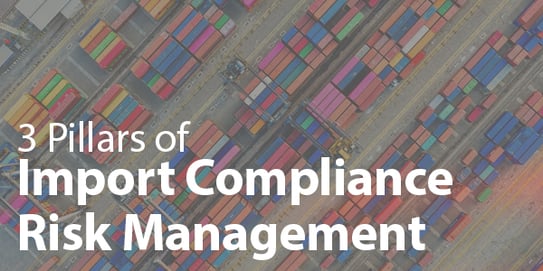
When companies don’t comply with trade regulations, they face fines, penalties, and potentially late delivery of their goods.
Trade compliance begins at the importer’s responsibility to exercise reasonable care. Customs needs importers to answer three key questions in their documents:
- What are you importing?
- How much does it cost?
- Where does it come from?
The responsibility for import compliance shifted to importers under the U.S. Customs Modernization Act of 1993 (Mod Act). Congress passed the Mod Act to increase voluntary compliance with trade laws as well as improve Customs enforcement of trade laws. The Mod Act enhances regulatory audit procedures. It beefed up enforcement and established penalties for importers who do not use reasonable care in providing accurate and timely documentation to Customs.
This legislation makes the risks of non-compliance very clear. The penalties for poor record-keeping, failure to declare proper classification, value, or origin, not meeting Free Trade Agreement requirements, supplying false information, etc., can reach millions of dollars. Companies can mitigate their risk by implementing an Import Compliance Program which helps ensure proper HTS classification of products, correct country of origin designation, and accurate valuation methodologies under existing trade laws and regulations. The Program helps ensure that importers pay appropriate duties and taxes on products, and can mitigate or prevent Customs inquiries. An Import Compliance Program includes developing a compliance team, writing a compliance manual and SOPs, and internal auditing.

Common Pitfalls to Compliance
The biggest hurdle to compliance may be the importers themselves. Some importers believe they know all they need to know and do not keep abreast of changes in trade laws. Below are some common attitudes that may hinder a company’s compliance.
“We’ve done it this way for years.”
Often, companies launch compliance efforts with good intentions but fall quickly from these practices. Compliance cannot be a one-time effort; it must be ongoing.
Companies who comply for some time and consider themselves risk-free may not be staying up to date with modernization or changes in laws and regulations. Just because you haven’t been caught yet doesn’t mean you never will. It’s possible you’re on the next target list, or rules change and what was considered compliant may no longer be acceptable. Partnering with a licensed Customs broker helps keep an importer’s compliance program knowledgeable and up to date. Customs brokers may be aware of regulation changes that require a company to adjust compliance practices. Knowledge is only half the battle, as companies must remain flexible to change according to the new regulations and policies. Importers who believe they have done things the same way for years without issue, so they do not see a reason to change now, are at most risk.
“My products are duty-free or come from Canada.”
Some importers believe if they don’t pay duties, they don’t have to worry about compliance. This can be a costly misconception. Even companies importing duty-free products need to remain Customs compliant. For example, if a company is importing products from Canada and they claim NAFTA, they must have all of their documentation in order. NAFTA claims are an automatic red flag for Customs.
Claiming NAFTA can have great benefits, but also comes with great responsibility and great risk. If importers make compliance mistakes on their duty-free products, Customs cannot go after duty, but they can go after the value of an importer’s products.
“My company has grown, but my compliance efforts are fine.”
Let’s say Company A imports products for five years and their imports increase by 500% year over year. This growth will raise red flags for Customs. It shows the company is likely growing faster than their compliance infrastructure, which may lead to mistakes.
Importers should consider their year-over-year growth for at least three years. If they find a deep growth curve, they may need to add staff to bolster their compliance efforts. A sudden increase in activity can overwhelm individuals in charge of compliance.
Related Topic: Why Trade Compliance Should be a Priority for Your Company
Pillar #1: The Trade Compliance Team
Many companies hire a Customs broker and believe that’s where their trade compliance responsibility ends. Yes, hiring a Customs broker is an excellent first step, however, Customs continues to hold importers responsible for knowing and adhering to trade laws and regulations. Companies can avoid Customs regulatory risks—as well as show reasonable care—by developing a strong and effective internal Trade Compliance Team.
Both the volume and complexity of import transactions should influence the size of your Trade Compliance Team, as well as the qualifications of each team member. It is also important to keep in mind that trade compliance spans a range of business activities. Therefore, compliance-forward companies ensure representatives from a host of company disciplines, including, but not limited to, logistics, sales & customer service, purchasing, inventory management, accounting, finance, and supply chain, are held accountable for their role in import compliance.
The trade compliance team oversees and controls importing and exporting activities by:
- Establishing a corporate compliance policy
- Setting minimum standards for record-keeping, product classification and valuation, and country of origin decisions
- Developing import-export compliance manuals and SOPs
- Training employees on their roles and responsibilities in trade compliance
- Keeping abreast of changes in regulations and notifying personnel about these changes
- Monitoring and auditing company adherence to corporate compliance standards
- Partnering with outside vendors, including brokers, forwarders, consultants, and others
- Providing oversight and working with Customs
When problems arise, Customs wants to know who handles import transactions and who oversees importing into the United States. With an import compliance team in place, importers can answer these questions quickly and effectively, helping to ensure shipping risk management and mitigation.
Pillar #2: The Import Compliance Manual
A well-written, comprehensive, fully implemented and followed Import Compliance Manual is your company’s physical manifestation of reasonable care. Customs won’t ask importers if they have a compliance manual; they will ask to see their compliance manual, so you need to have one. Customs view importers without documented policies and procedures to be at risk of violating trade regulations.
An import compliance manual should include the company’s customs policies, roles and responsibilities of all functions impacting imports, documented import procedures, internal controls, and record-keeping methods. Whether this document is ten pages or one-hundred pages long, it must be easy to understand, as well as tailored to the importer’s specific operations.
Pillar #3: The Internal Audit
Every compliance program needs an audit program not to find errors - though that may happen, but to test the effectiveness of the policies and procedures put in place by the Trade Compliance Team and codified in the Import Compliance Manual. The size and cadence of internal audits vary by company, but every internal audit program should have the following attributes:
- Routine Cadence (can be weekly, monthly, quarterly, or semi-annually)
- Quality Audit Sample (size and composition must be sufficient to surface risk - you want to find it before Customs does)
- Audit PO to Payment (audit internal records to ensure what was declared to CBP is what actually happened)
- Remedial Action Recommended and Taken (track all action items to completion)
- Report Findings (findings should be reported internally to Management and/or Legal)
The goal of your Import Compliance Program is ultimately risk management. Importers must meet reasonable care obligations by creating and maintaining their compliance procedures in order to adhere to laws & regulations put forth by Customs. If importers can master import compliance, they can leverage what they know about Customs and may use it as a competitive advantage.




